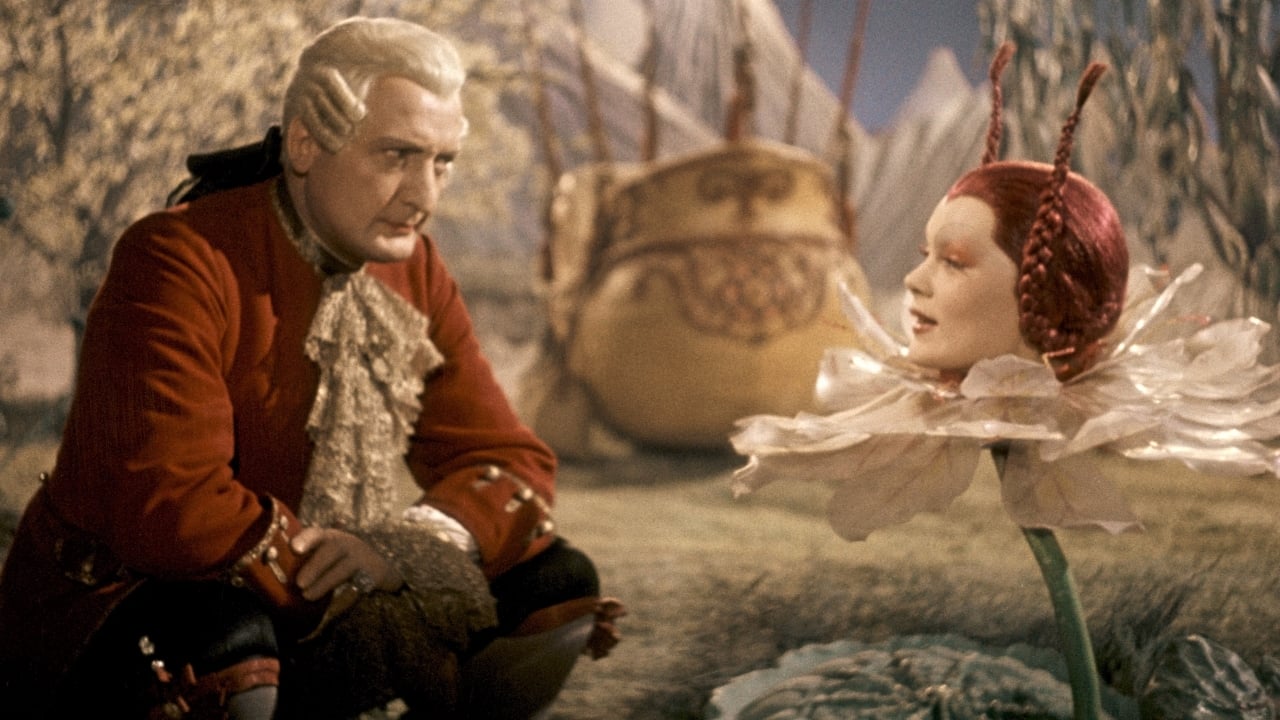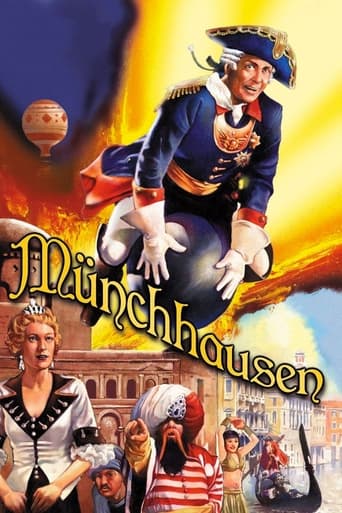

Charming and brutal
... View MoreA very feeble attempt at affirmatie action
... View MoreJust intense enough to provide a much-needed diversion, just lightweight enough to make you forget about it soon after it’s over. It’s not exactly “good,” per se, but it does what it sets out to do in terms of putting us on edge, which makes it … successful?
... View MoreAll of these films share one commonality, that being a kind of emotional center that humanizes a cast of monsters.
... View MoreWhen I look at how many people have rated this film, and I think of all the movie lovers out there who have never seen, or even heard of this delightful gem; It saddens me. I truly believe that it is among the greatest achievements in the history of film. The unique pastel colour is magnificent, and the film is filled with hilarious and daring moments. Especially when you consider that Münchhausen is a Nazi era 1943 German film; It really is hard to believe that this is true.Acclaimed director Terry Gilliam of Monty Python and 12 Monkey's fame, obviously tried to draw more attention to this striking wonder when he made his own version of this tale 'The Adventures Of Baron Munchausen' in 1988. If it wasn't for Mr.Gilliam, I probably would have never bothered to even watch this film. So I owe him many thanks as Münchhausen has easily become one of my all time favorite films. The pace, humour, and sheer originality of this fantasy make it one of the easiest subtitled films to watch in existence, period. It ranks up there with the greatest pre-1950's films such as The Treasure Of The Sierra Madre, and Chaplin's brilliant City Lights. If you love movies, if you love classic cinema, if you love original fantasy films, if you love humorous films; Seek out 1943's Münchhausen whatever you do. It will not disappoint. This film is certainly not for children. However, in terms of flat out fantasy entertainment, I would say that this nearly 70 year old antique blows away Peter Jackson's Lord Of The Rings films any day, and easily. Enough said.9/10
... View MoreI'm surprised by the number of positive reviews of this film. I think we tend to give old films benefit of the doubt since we can never see them in the same context as they were meant to be seen, i.e. as some one in 1943. I found this film to be weak in plot and rambling. I'm sure the special effects were revolutionary for the day, and the film had an extravagant budget. Unfortunately for many films with those characteristics the plot was completely overlooked and butchered in the attempt to patch all of the effects together in a cohesive story (sound familiar, Lucas?). The acting, in contrast to the extravagant costume and effects, seemed unprofessional and frivolous.If you think I'm being too harsh, take a look at its contemporary, "The Wizard of Oz." It had similar scope in terms of effects, commentary on society, yet far more expertly executed and coherent in its acting and plot. Maybe I'm being too harsh. Maaaaybe. But this film was created after "Wizard," and I think the producers could have endeavored a bit more to match its standards of quality.I'm curious to know if this film has survived the test of time in Germany as "Wizard" has in the USA.
... View MoreThe fabulous exploits of Baron MÜNCHHAUSEN include several wars, numerous plots and beautiful women without number.At the height of World War Two, as the tide was beginning to turn against the Third Reich, Hitler's Minister of Propaganda, Joseph Goebbels commissioned this lavish motion picture as a commemoration of the 25th anniversary of Ufa, the government-run German film association. More importantly, it was also to be a rival of the great fantasy films which had come from the Allied nations, such as THE WIZARD OF OZ (1939) and THE THIEF OF BAGDAD (1940). In that it succeeds brilliantly and needs no comparison to any other film.The film is a great, lighthearted romp as it follows the adventures of the Baron from Prussia to St. Petersburg, Constantinople, Venice and even the Moon. It is fascinating to see the high quality which the Germans were still able to lavish on the picture, even as their Empire was beginning to crumble around them. The production values are of a very high order and the Technicolor photography is sumptuous to the eye. Remarkably, there is no National Socialist propaganda in the film and the War is never mentioned.In the title role, Hans Albers gives a surprisingly sensitive performance for such a robust production. He takes the legendary character and gives the viewer a portrait of a dashing, reflective, amorous, compassionate, resourceful man. Whether riding on a cannonball, ingratiating himself with the Ottoman Sultan, or examining the fantastic flora of the lunar planet, Albers always makes Münchhausen totally believable.All the acting is of a high order, but especially worthy of mention are Ferdinand Marian as the mysterious Count Cagliostro, Brigitte Horney as a flirtatious Catherine the Great, and Gustav Waldau as an aging Casanova.It should be mentioned that this is not a movie for children. Given its European origins it should come as no surprise that MÜNCHHAUSEN is a good deal more libidinous than the standard Hollywood fare of the time.**************************There was a real Baron Karl Friedrich Hieronymus von Münchhausen (1720-1797), a German adventurer and teller of tall tales, but he had nothing to do with the book of fictional exploits which borrowed his name, written by Rudolf Erich Raspe (1737-1794), upon which this film was based.
... View MoreI found the film to be very enjoyable. I was impressed with the use of color. The film used Agfacolor film, which if memory serves me correctly was based on pastels, not at all like Technicolor. The film is very rich and vibrant in its cinematography and color, this is very much appreciated when one sees the work that went into the Moon set.Hans Albers plays an arrogant but lovable rogue who takes many, many years to learn the lesson of what is truly important in a mans life.I am in agreement with one reviewer in that this film is not at all for children and should be screened carefully, this is a European film and the Hayes Act didn't exist in Germany.
... View More